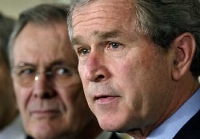Bush administration aims to strengthen ties with Turkey after recent elections in the country
Bush administration officials announced Turkey's recent election results were an opportunity to improve the relations with an important ally, but they still see difficulties that may not be under their control.

The first is that Congress, led by opposition Democrats, has a proposed resolution up for debate that would recognize World War I-era killings of Armenians as genocide - a view Turkey adamantly rejects.
The other issue is in the hands of the Iraqi government: A possible referendum on incorporating the oil-rich city of Kirkuk into the autonomous Kurdish region in northern Iraq. Turkey opposes the referendum, fearing it could boost Kurdish separatists in Turkey, and sees it as another example of U.S. policy gone awry in neighboring Iraq.
"Turks would blame the U.S. for its failure to prevent the referendum because they believe they hold sway as the occupying power," said Bulent Aliriza, the director of the Center for Strategic and International Studies' Turkey research program.
The United States wants to strengthen ties with Turkey, a strategically important NATO ally located at the crossroads of Europe, the Middle East and Central Asia. U.S. officials view Turkey, a secular democracy with a majority Muslim population, as a model for other nations.
But relations have been strained, largely over the Iraq war. Turkey refused to allow U.S. troops to use its territory to invade Iraq in 2003 and Turks continue to oppose the war. A recent poll by the Pew Research Center found the United States had only a 9 percent favorable rating in Turkey.
Turkey has criticized the United States for failing to stop Kurdish guerrillas from the Kurdistan Workers' Party, or PKK, in northern Iraq from carrying out attacks in Turkey.
On Tuesday, Iraqi Prime Minister Nouri al-Maliki promised during a visit to Ankara to work with Turkey on combatting the PKK. He said he would seek a mandate from the Iraqi parliament for the cooperation, a move that could ease Turkish concerns.
Some analysts had feared that Turkey might invade northern Iraq ahead of the July 22 elections, to boost Prime Minister Recep Tayyip Erdogan's nationalist credentials.
But Turkey did not invade and Erdogan's Justice and Development Party, or AKP, won an overwhelming victory.
The U.S. believes the win provides an opportunity to boost ties. Despite the party's Islamic roots, Erdogan and other leaders are seen as open to closer integration with the West and improving U.S. relations.
"This is an optimal outcome," said U.S. Deputy Assistant Secretary of State Matt Bryza in an interview. "The AKP is a known quantity."
Some critics of the administration say the White House needs to move urgently to repair relations with Turkey.
"There has been massive policy neglect," said Richard Holbrooke, former U.S. ambassador to the United Nations under the Clinton administration. Holbrooke, who is now supporting Sen. Hillary Clinton's Democratic presidential bid, said that Turkey should be treated as the most important strategic ally in the region.
But, that may be difficult as congressional Democrats push for the Armenian genocide resolution.
Historians estimate that up to 1.5 million Armenians were killed by Ottoman Turks, an event widely viewed by scholars as genocide. Turkey denies that the deaths constituted genocide, saying the toll has been inflated, and that those killed were victims of civil war and unrest.
Turkish officials warn that if the resolution is approved, they will shut down routes to Iraq from Turkey that the U.S. uses to bring in most of its military supplies.
The resolution has strong support in the House of Representatives, but will hinge on whether Speaker Nancy Pelosi and Chairman of the Foreign Relations Committee Tom Lantos, both Democrats, bring up the measure for votes. Both Lantos and Pelosi have previously supported it, but are under intense pressure from both sides.
They agreed to delay action on the referendum until after Turkey's election, congressional aides said. But the expectation in Congress is that it will likely pass this year.
The other source of tensions is the Kirkuk referendum, which the Iraqi constitution says must be held by the end of the year.
Turkey fears it would be a step toward an independent Kurdistan and could endanger ethnic Turks who live in the region.
But last week, the leader of Iraq's Kurdish region, Massoud Barzani, warned of a "real civil war" if the central government does not hold the referendum. And the U.S. says the decision is for the Iraqi government to decide.
Analysts say that the U.S. could achieve goodwill in Turkey by ordering military action against PKK fighters holed up in remote mountainous territory. But U.S. officials are reluctant to widen the Iraq conflict, taking on new combatants and increasing violence in what has been Iraq's most stable region.
Democratic Rep. Robert Wexler, who advocates close ties with Turkey, said that U.S. military officials have told him the U.S. is closer to moving against the PKK.
"American and Turkish forces are cooperating to counter the PKK in a more concrete way than they were six months ago," he said. "Counterterrorism operations and strategies are being employed." He declined to elaborate.
Subscribe to Pravda.Ru Telegram channel, Facebook, RSS!





